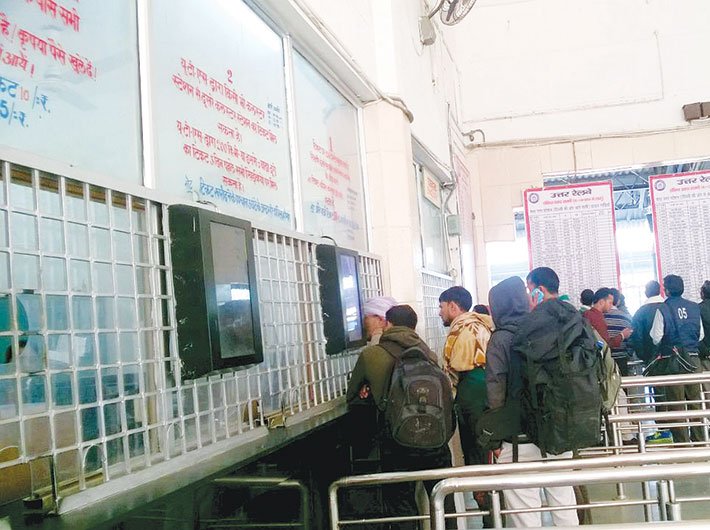If Indian Railways wants to go digital, it will need to do so in a big way. With just 76 point of sale (PoS) terminals at 63 stations across the nation, a beginning has hardly been made
One day last December, Shyam Kishore got into an argument with a railway clerk at Meerut City station. Kishore, who commutes daily by train between Meerut and Ghaziabad, had decided to renew his monthly pass, which costs Rs 300 at the station counter. But the clerk at the counter refused to accept the Rs 2,000 note from Kishore as he didn’t have change and asked him to tender the exact amount. The talk everywhere is of going cashless, but Shyam Kishore couldn’t have slid his debit card across the counter to end the scrap. Like most unreserved ticket counters in India, the ones at the Meerut station too do not have point of sale (PoS) machines.
With a monthly income of Rs 12,000, Kishore prefers to buy a monthly pass which comes out to be cheaper than a regular ticket. Despite his repeated requests, Kishore was asked to leave and let others buy tickets. Kishore then somehow managed to get change of Rs 2,000 and bought his ticket. “I felt as if I won some war,” he chuckled.
In fact, lakhs of daily train commuters who travel in general class compartments may not be able to buy tickets using their cards. This is because, as per railway board data, there are only 76 PoS terminals at 63 locations across India which accept debit and credit cards – out of about 14,000 unreserved ticket terminals and 13,000 computerised reservation terminals. The railways thus doesn’t even meet one percent of the digital demand of the country in allowing sale of tickets through plastic money.
In 2015-16, 1,992.8 lakh tickets were booked through the IRCTC website. According to the railways data, 55-58 percent of the reserved tickets are sold through IRCTC. This means the remaining 42-45 percent tickets are sold at the counters. So, basically, we have just 76 PoS terminals to cater to about 1,400 lakh tickets every year. Way to go Digital India!
Waiting at the platform to board the Saharanpur-Delhi passenger train at 7 am, Kishore says that none of the four unreserved ticket counters at the Meerut station have a PoS facility. He adds that now he has to set aside Rs 300 every month to buy his monthly pass.
“Before demonetisation, I never even thought of paying through my debit card. But now, I often recharge my phone and dish TV connection through an ATM card. I read in newspapers that a few machines would be installed at railway stations to encourage people to go digital, but sadly that is not the case with Meerut where thousands like me often haggle with ticket booking clerks over change,” says Kishore while sipping tea.
Ashish Sahu has come to meet his sister in Meerut from Delhi, where he runs a grocery shop. He laughs at the idea of putting PoS machines at the unreserved ticket counters. “Who is going to use these machines if one does not have an ATM card? Think about those who earn just a couple of thousand rupees to make ends meet. It is only due to demonetisation that people have now started opening bank accounts to get ATM cards, otherwise they hardly showed any interest.”
Sahu candidly says that even liquor shops have started using PoS machines to retain the loyalty of their customers but it is difficult for the railways to do so because of its vastness and the staggering number of counters.
Travelling to the national capital, a group of college students seem to have found a way out. “The only way to avoid an altercation with the railway staff is not to buy tickets if they ask us for change,” says Rahul Singh. He adds that despite the risks involved, students often travel without tickets because there are no ticket examiners in general class coaches. “Who’s going to enter into a carriage full of hundreds of passengers?” he asks.
Rahul is right about the overcrowded coaches. In Meerut, Kishore too had expressed displeasure with the rail service. “People in general class compartments travel like animals. About 250-300 people travel in a single general coach since there are not many carriages. I get a seat on some days if I am lucky, otherwise most of the times I have to spend hours standing.”
Another student Dinesh Kumar jumps into the conversation. He says it is a matter of only few weeks before the cash flow becomes normal. “The government has surely taken a good step by demonetising Rs 500 and Rs 1,000 notes to curb black money. However, it did not do its homework properly which has led to chaos everywhere and also left railway commuters in the lurch.”
Dinesh hopes to soon use his ATM card at railway counters but adds that the railways may give preference to major stations to provide PoS machines. He too complains, “There is literally no possibility of getting a seat in the general class. People can even be seen sitting in lavatories because they do not have any other option. Will the railways provide better amenities if we use plastic money?” he asks.
A look at the computerised passenger reservation system (PRS) counters also brings a dismal picture to the fore – they are still waiting for PoS machines. A chief booking clerk, who is seen allotting tokens to people assembled to buy tatkal tickets, says none of the three reservation counters at the Meerut station have PoS machines. “We have yet to get directives,” he says.
Mohammed Ismail has come to buy a tatkal ticket at the Meerut station. But he quietly leaves the counter as he fails to get a confirmed ticket. He feels the railways should install PoS machines at reservation counters where huge transactions take place. “A person has to spend minimum Rs 500-600 to book an AC 3-class reserved ticket but getting cash has become an uphill task. Majority of the people who travel in AC class usually have debit and credit cards. Yet, they can’t make digital transactions at PRS counters in Meerut, which is absurd,” says Ismail.
Kishore feels the government should first ensure that everyone has a bank account and an ATM card before introducing PoS machines at unreserved counters. As Sahu also says, “Pehle ATMs me line lagao taki paise mil sake, phir railway counters par (First we have to stand in serpentine queues at ATMs to get the new currency, then at the railway counters).”
[email protected]
(The story appears in the January 1-15, 2016 issue)



